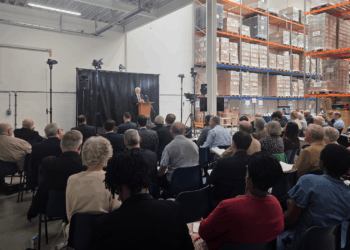Garvan Walshe is a former national and international security policy adviser to the Conservative Party. He runs Article7 – Intelligence for democrats.
Tomorrow Trump and Putin will meet in Alaska — supposedly to discuss Ukraine. Speculation abounds that Trump’s current mood, after some weeks where he seemed to be returning US policy towards grudging support for Kyiv, even threatening Russia with more sanctions, has become more sympathetic to the Kremlin. Trump even mused about “land swaps” between Moscow and Kyiv.
As policy, land swaps come with a big, obvious problem: they involve Russia giving up Ukrainian territory it controls in exchange for Ukraine giving up Ukrainian territory it controls. Such swaps are nothing of the sort. They’re like a robber who has already stolen £100 from you agreeing to give you back £50 if you give him another five tenners.
But as an attention seeking device they are perfect. They evoke fear that Trump will abandon Ukraine. They cause Western leaders to rush to try and placate him. Sixteen of them wrote to him, pretending to support his initiatives for peace. Germany has convened a pre-meeting between Trump and several European leaders in the hope that he will remember some of it when he meets the Russian leader.
Though they have drawn criticism as appeasement, this is wide of the mark.
In reality both the diplomatic whirlwind and the appeasement critique make the Big Mistake of Trump Analysis, which is to treat him as an erratic and oversensitive head of government, a kind of 21st century Kaiser Wilhelm. Erratic and oversensitive he certainly is, but he thinks of the American government as private property he’s bought in some kind of deal — to be used to continue his business. If it was President Coolidge who is often quoted as saying that the business of America is business, the business of Trump is definitely Trump.
And if most politicians use the attention their office brings to exercise power, Trump is different. He uses the power of the office to command attention.
Understanding the Trump Administration requires us to keep this fundamental fact in mind. He cares about symbols, not substance. Because he thinks of himself as a dealmaker, he likes doing deals, but it is the ceremony and symbolism of the deal that interests him, not his substance.
Wise foreign leaders try and exploit his desire for any kind of agreement to extract concessions. Putin will undoubtedly hope to, particularly as his economy is suffering, and ever older stocks of military equipment are being sent to the front. His one advantage is men, of which he still has plenty to sacrifice (Ukraine has stabilised matters on the drone front where Russia had taken a lead with fibre-optic first-person view machines).
But when it comes to Ukraine, Trump only cares about the symbolism of any agreement with Putin. He won’t follow through on it. Western leaders, a category that should not currently be understood to include the US President, need to think about how to supersede any symbolism that might emerge from Tomorrow’s Alaska meeting, and ensure any concessions Trump makes are not acted on.
On Ukraine itself, the biggest criticism of West-European leaders is not appeasement of Washington, but combining tough talk with self-interested sloth. Macron warns of the Russian threat, but then opposed the swift implementation of European ammunition buying schemes that would have supplied shells to Kyiv because some of it was to be sourced from outside the EU.
Starmer likewise promises Ukraine support, but shies away from the domestic political battles needed to re-equip the UK’s underfunded armed forces, and hedge against overdependence on American kit. Spain is probably right to ditch the overpriced F-35, no longer the right match for a budget it refuses to bring to the new 3.5 per cent core spending target, but could do with accepting the responsibility that comes with its strong economic growth.
Italy likewise talks a good game, and then insists that a £11 billion bridge to Sicily is an essential contribution to defending Europe against Russian attack. Germany appears to be getting its rearmament going, but risks using it as a job-creation programme for engineers no longer needed to make civilian internal combustion engines, and whose tanks will duplicate already procured Polish equipment, than something that will meet the requirements of 21st century warfare.
Damage limitation gambits, like the pre-meeting videoconference with Trump might be unavoidable. But they need to be accompanied by demonstrations of strength and support for Kyiv. The United States now only accounts for a tenth of military support for Ukraine. Though some of it is particularly critical, notably air defence and intelligence, in the last six months Europeans have shown they can, together with like-minded allies in Asia, meet most of the gap left by Trump cutting and running.
The best way to respond to any grandstanding in Alaska will be to announce, and swiftly implement, plans to remove the last elements of dependence on the US administration. Then let Putin and Trump have as many summits as they like while we concentrate on weakening the Russian war machine and economy.





![ICE Arrests Illegal Alien Influencer During Her Livestream in Los Angeles: ‘You Bet We Did’ [WATCH]](https://www.right2024.com/wp-content/uploads/2025/08/ICE-Arrests-Illegal-Alien-Influencer-During-Her-Livestream-in-Los-350x250.jpg)
![Gavin Newsom Threatens to 'Punch These Sons of B*thces in the Mouth' [WATCH]](https://www.right2024.com/wp-content/uploads/2025/08/Gavin-Newsom-Threatens-to-Punch-These-Sons-of-Bthces-in-350x250.jpg)








